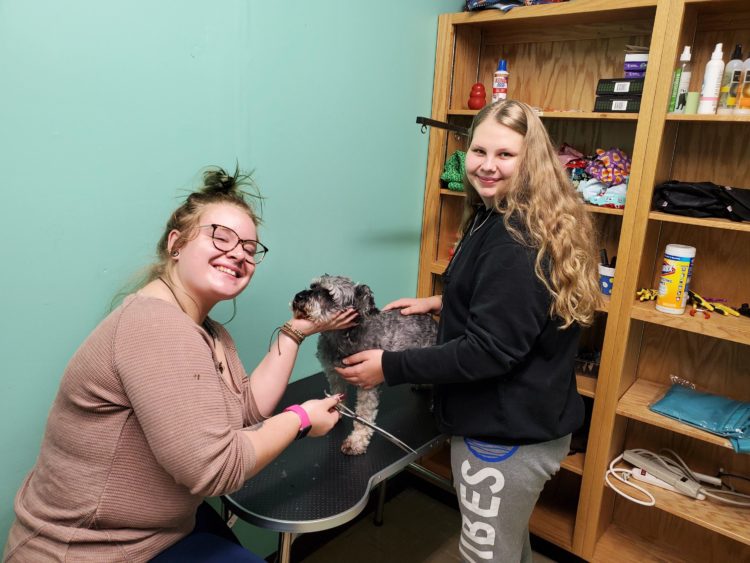Oct. 20, 2020 – Inside one classroom at Frank H. Peterson Academies of Technology, ferrets greet students as they walk through the doors, guinea pigs gobble up afternoon snacks and the teacher’s pet…is actually a pet.
It’s all part of the school’s veterinary assistant program.
Supported by the district’s Career and Technical Education team, the program features special academic courses and instruction in a small-animal lab filled with rabbits, gerbils, turtles and snakes. And that’s just inside! An outdoor space houses goats, chickens and pigs.
Students receive hands-on time with these animals as part of their training to receive a Certified Veterinary Assistant Certificate. The interaction with the animals gets more and more hands on as they move into their junior and senior years. They also must meet a set of requirements to receive their certification, which includes passing coursework, completing 250 contact hours with a veterinarian and passing the state exam.
The program proves invaluable for students who want to gain real-world experience in the field of animal care, said agriscience teacher Julie Lee.
“What was once a passion for animals is now a career in the making for these students,” said Lee. “For those who love animals and enjoy working with, helping, and bettering the lives of animals, there’s almost no more rewarding career than a veterinary assistant. They play a vital role in the daily hustle and bustle of animal hospitals and veterinary clinics – and provide the best possible care to their animal patients.”
Team Duval News spoke with Lee to get more insight into the program.
- What exactly does a veterinary assistant do?
Lee: The vet assistant helps with all duties in a veterinarian office from greeting clients to assisting with exams, and post-surgical care. - Tell me about the experience your students gain from this program.
Lee: Students learn basic skills for animal care, such as grooming, ear cleaning, nail trimming, and bathing, practice hands-on examination with replica and live animals, and learn the professional ethics of this occupation. They also develop valuable life and employment skills.| - How does your program prepare students to work in animal hospitals and clinics?
Lee: The curriculum covers safety, animal anatomy, nutrition, behavior and veterinary medical terminology, animal diseases, prevention, and treatment, along with first aid. Students also gain hands-on skills such as handling, administering medications, and basic animal care while working with companion animals in the classroom. - Do your students care for animals daily?
Lee: Students are responsible for many daily tasks, such as feeding, handling the animals, cleaning cages, and looking for abnormal behaviors. - Do you have partnerships with local animal organizations and clinics?
Lee: We are partners with First Coast No More Homeless Pets as well as several local veterinary offices. These partnerships give our students opportunities to get real-world experience and hands-on training by working alongside some of the best medical professionals in the field. - Will students need to pass an exam to become certified as a vet assistant?
Lee: They must pass an exam at the end of their senior year. The certification ensures that they are efficient and competent in their duties. - What three qualities make a good veterinary assistant?
Lee: Compassion, patience, and a strong work ethic.
More information is about the program is available by visiting the Agriscience Biotechnology Academy webpage. Rebecca Miller, a CTE specialist with the district, writes a regular blog that highlights the many district CTE programs offered.








